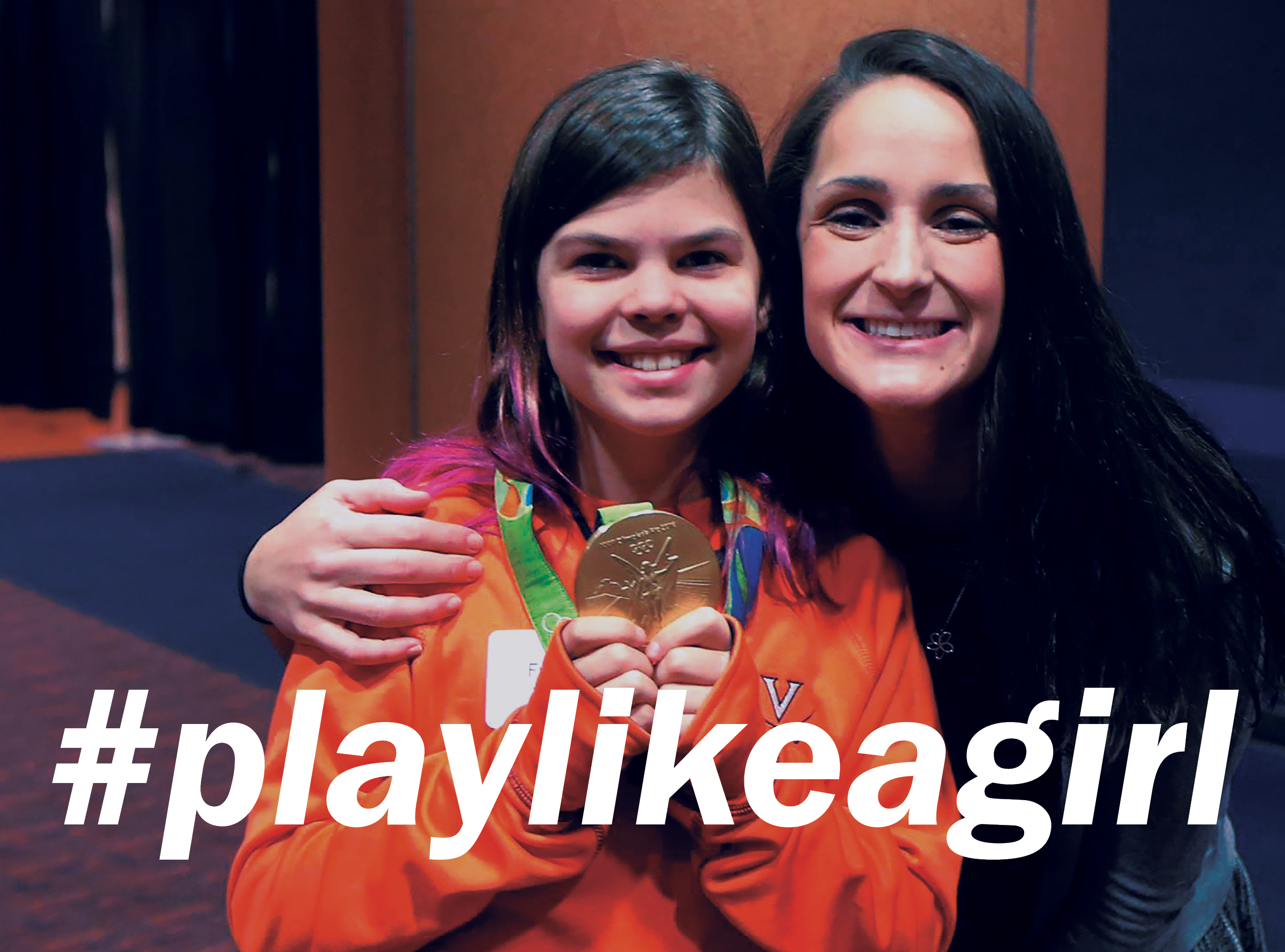
Last January, I had the joy of welcoming many of you to JPJ for our annual National Girls and Women in Sports Day celebration, where alumna Jennifer Langton was honored for her athletic accomplishments on UVA’s lacrosse team and her off-the-field contributions to the NFL as Senior Vice President of Health and Safety Innovation.
In my welcome, I shared a little-known personal fact:
I feel compelled to start with a perhaps surprising confession coming from the director of the Women’s Center: I love watching football. I learned to love it watching from the sidelines as a high school band/color guard geek in the late 80s. Both of my brothers played – as well as my 4’-something younger cousin Kate. The speed, the choreography, the athleticism, the camaraderie all combine to create an experience for me as a spectator that I can’t quite explain – I can only admit how much I enjoy it. I love football – but I feel guilty when I watch it. As we’ve learned more and more about the impact of the sport on the players’ brains, my concerns have grown. Jennifer’s leadership at the NFL, working to ensure the safety of the players, is one of the reasons I’m excited that we’re honoring her today. At the Maxine Platzer Lynn Women’s Center, we are committed to supporting the people who dedicate their time and talents to protecting others. The choice to play football – or for parents, to allow your child to play football – is a complicated, ethical decision, requiring the balancing of the potential gains against the more likely risks. Some programs are run well, but others treat the players as commodities. We admire the work of Jennifer’s team, who in focusing on the health and safety of the players, demonstrates concern for their human dignity.
This season, football fans have witnessed women challenge long-upheld barriers. After making football history on November 28, 2020 as the first woman to play in a Power Five conference game, Sarah Fuller became the first woman to score in a major conference college football game when she kicked two extra points in Vanderbilt University’s game against the University of Tennessee on December 12. The senior goalkeeper for the Vanderbilt women’s soccer team, Fuller took the field for the football team to cover for players quarantined for coronavirus. Her helmet was emblazoned with the slogan “Play Like a Girl.” Fuller follows four other women who previously scored points in a college football game: in 1997, Liz Heaston kicked two extra-points for Williamette in the National Association for Intercollegiate Athletics; Ashley Martin kicked three extra points for Jacksonville State in 2001, the first woman to score in a Division I college football game; and Katie Hnida kicked two extra points for the University of New Mexico (against Texas State) in 2003 and April Goss kicked an extra point for Kent State (against Delaware State) in 2015, both Football Bowl Subdivision games.
In another ground-breaking first, Sarah Thomas will be the first woman to officiate a Super Bowl on February 7 when she is down judge. In the announcement of the officiating team, NFL Executive Vice President of Football Operations, Troy Vincent, Sr. congratulated Thomas, “Her elite performance and commitment to excellence has earned her the right to officiate the Super Bowl.”
Begun in 1987 to bring national attention to the promise of girls and women in sports, National Girls & Women in Sports Day (NGWSD) has since evolved into an event to acknowledge the accomplishments of female athletes and the benefits of sports participation, which encourages women and girls to reap the benefits of physical activity and push past limits, both physical and mental, to define new measures of success for themselves. As the national organization sponsoring NGWSD notes, “The confidence, strength and character gained through sports and physical activity are the very tools girls need to become strong leaders, in their own lives and in the world.”
Although our annual NGWSD gathering has been cancelled in observation of pandemic restrictions, the benefits that athletics offers women are as crucial as ever to the girls and young women discerning how to navigate our world. This year, I offer a look back to my first Palko POV column, in which I reflected on my first NGWSD welcome:
to celebrate Leah Smith and the importance of athletic opportunities for women on National Girls and Women in Sports Day, I had chosen to share another piece of history that also reminds us to more closely consider the movement of the body in and through the public sphere. In a Technology column for The Atlantic a few years ago, Maria Popova recommended Sue Macy’s book, Wheels of Change: How Women Rode the Bicycle to Freedom (With a Few Flat Tires Along the Way), which relays the story of the transformative role that the bicycle played in women’s evolving relationship to the public sphere. Popova includes Macy’s excerpt from a May 1896 article entitled “Woman and the Wheel” in Munsey’s Magazine (the first mass-marketed US magazine): “To men, the bicycle in the beginning was merely a new toy, another machine added to the long list of devices they knew in their work and play. To women, it was a steed upon which they rode into a new world.” The bicycle opened up a world that had been constricted by the clothing women wore, restrictions on their movement in the public sphere, and their economic dependence on the men in their lives. Straight through from Susan B. Anthony’s own day to the present, those in the know have been bold in their assertions that the bicycle played a very real role in the movement for women’s suffrage in the U.S. So, I’ve found myself thinking a lot in the past few weeks about how the concept of identity politics shapes our perceptions of the world through which we move. This is crucial because when any single one of us is vulnerable, every single one of us is vulnerable. Identity politics matter precisely because when we marginalize anyone on the basis of their identity, we have accepted the premise that it is ok to marginalize anyone on the basis of any aspect of identity. And, as many of you know, we need to carry this insight one important step further. While we each experience the world through the lenses of our various aspects of our identity, for those of us who identify with multiple marginalized groups, our marginalization is exponentially magnified.
I will leave you with the same two closing thoughts I did at our NGWSD event four years ago. I hope you'll agree they are just as timely now as they were then, or perhaps even more so: It is crucial that we remember to listen to women, to hear and honor their experiences and ways of moving through the world – and it behooves us to dance!

